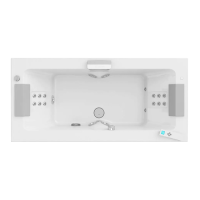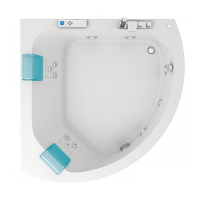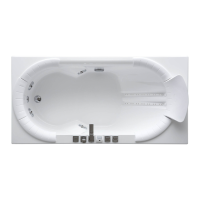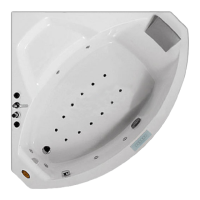28
What is hydromassage
Hydromassage is a form of therapy which takes place using wa-
ter jets at specic pressures and directed in a clearly dened di-
rection.
The Jacuzzi® hydromassage tubs represent the results of de-
tailed design research and are designed so that specic atten-
tion is paid to the position of the jets, which are considered in
terms of the ergonomics of internal forms, to optimise the ef-
fects of the hydrotherapy actions.
Therapeutic properties
Stimulation of the skin using warm baths and hydromassage in-
creases the circulation, blood ow, even the lymphatic system,
activating enzyme activity stimulants.
Hydromassage provides signicant eects in terms of treat-
ing issues associated with blood circulation in the legs, but also
in the case of osteoarthritis, rheumatic disorder, phlebitis.
The therapeutic properties of hot water are eective for all
body types, sizes and to meet all stress levels and serve an ex-
tremely important role for many patients suering with mus-
culoskeletal pain, all thanks to the heat and hydrostatics of the
water.
Play of water
The hydromassage tub can serve as a place in which to carry
out some simple well-being exercises, which are simultaneous-
ly, exciting. Attempt to follow our recommendations: the water
makes all movements easier.
Legs: resting on the backrest, lift one leg, bend it and slowly bring
the knee to the body, stretch out the leg and repeat the exercise
three times with one leg and then switch to the other leg. You may
complete ve consecutive sets.
Abdominals: resting on the backrest, breathe in deeply and whilst
breathing out, contract the abdominal muscles. Carry this exercise
out slowly, aiming to complete ve sets. You can slowly increase the
number of sets up to ten consecutive sets.
Shoulders and neck: make sure your shoulders are immersed;
using a circular movement, slowly rotate the shoulders forwards
and backwards ve times. In this same position (with the shoulders
immersed), gently and slowly move the head from one side to the
other.
Take a break between exercises, completing three full sets; you can
slowly increase the number of sets up to ten consecutive sets.
Relaxation: after having completed the exercises, sit down, close
your eyes and do some slow breathing exercises (breathing in and
out).
